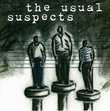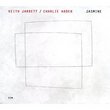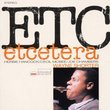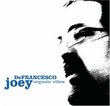| All Artists: Ryan Quartet Kisor Title: Power Source Members Wishing: 1 Total Copies: 0 Label: City Hall Records Release Date: 3/6/2001 Genre: Jazz Style: Number of Discs: 1 SwapaCD Credits: 1 UPC: 712474119620 |
Search - Ryan Quartet Kisor :: Power Source
CD DetailsSimilar CDs
|
CD ReviewsExcellent Small-Group Jazz Stephen A. Smith | Boston, MA | 03/11/2001 (5 out of 5 stars) "I've been keeping my eye on Ryan Kisor for awhile now. His previous two discs for Criss Cross ["Battle Cry" and "Point Of Arrival"] were good enough; but there was a quality to them that could only be described as untapped talent -- something suggestive of a promising future. Now, with "Power Source," I think Kisor has broken through to another level.First, let me fill in the blanks that Amazon left:Ryan Kisor Quartet: "Power Source"; Criss Cross Jazz 1196, ©2001.Power Source [6:17] / Salome's Dance [11:56] / Duke Ellington's Sound Of Love [8:27] / New Picture [7:26] / Boogie Stop Shuffle [6:11] / Pelog [6:03] / Bird Food [7:38].Ryan Kisor, trumpet; Chris Potter, tenor saxophone; James Genus, bass; Gene Jackson, drums.[There is a label website, complete with artist index, located at: http://www.crisscrossjazz.com/.]The first thing I noticed was the instrumentation. Apparently this date was scheduled to be led by pianist David Kikoski, who was kept from attending by a broken wrist. While I think Kikoski is a wonderful player and composer, having heard this record, I'm glad he didn't make the date. The instrumentation these musicians were faced with presents two possible courses: fudge the heads with single-horn or unison lines and hurry into alternating-trio solos; or actually sit down, confront the situation as musicians, and mine the unique possibilities presented. Kisor and company chose the latter; the result is the some of the best small group jazz I've heard yet this year.The title track, an uptempo Kisor original, might be the best example of how directly Kisor dealt with this instrumentation. Without any harmonic instrument, he suggests the harmony in a more linear fashion: counterpoint. All the best big band writers, from Duke Ellington to Herb Pomeroy to Bob Florence, have said that the best harmonic ideas come from good lines. Music occurs in time; we tend to hear harmony not as vertical structures played on a piano, but as a progression, related from one step to the next. Kisor's approach here is the most natural, in some respects, but also the most difficult, as it calls upon those musical talents which form the "craft" of composition. Kisor succeeds admirably. The trumpet and tenor lines interact beautifully, with precision, and the tune proceeds to offer the disc's soloing introductions.On the second track, the compositional duties are handed to Chris Potter. "Salome's Dance" is taken at a more relaxed tempo; it, too, is a solid composition (this, together with "Pelog," nicely demonstrate Potter's gift as a composer), but its greater value in the program here is that it is taken at some length, giving the musicians more opportunity to stretch their improvisational chops. Both Potter and Kisor make impressive statements: melodic, logical, and interesting. Their solos are considered as whole statements, rather than phrase-by-phrase or chorus-by-chorus; this is an important characteristic, which 'separates the men from the boys,' so to speak.The only other track I'll refer to specifically is Charles Mingus's "Boogie Stop Shuffle," simply because its arrangement [uncredited; presumably, Kisor's work] is masterful. This is one of those tunes where a smaller instrumentation can sound very conspicuous. Kisor sidesteps the problem with five very quick, clever choruses. He takes a mute to his trumpet and duets through the initial melodic statement with the bass for the first chorus. On the next two, Potter plays the same figure alongside Genus, while Jackson joins in on the hi-hat; Kisor offers muted "wah" punctuation to the melody, progressing slightly from the second to third choruses. The fourth sees the entry of a new melodic statement, played by Kisor (now on open trumpet) and Potter in unison, while Genus continues to pedal through the first melody. Finally, Kisor and Potter repeat themselves on the fifth chorus, while the texture changes behind them with Genus switching to a walk and Jackson kicking in the snare and ride cymbal.These first five choruses take up only forty-five seconds of a six-minute-plus tune; but in my estimation, those forty-five seconds are where the real genius lies. This isn't one of those readings where a small group "suggests" a tune; the listener unquestionably hears Mingus's "Boogie Stop Shuffle," here, never once lamenting the instrumentation. This is a real credit to the musicianship of these four players.Chris Potter is one of the three or four names on the short list of young saxophonists in real contention for "hall of fame" status. He's a thoughtful and inventive player; this is far from the only worthwhile record to which he's contributed. Gene Jackson displays an attentive ear, something vital to any drummer, but especially so in this case; he is constantly responding to and prodding along the soloists, while remaining firmly locked with the bass. For his part, James Genus holds down the musical ground as firmly as Atlas might have held up the world. A bassist must not only play the right notes; he must also play them with confidence, for it is upon him which all else musical is built. Genus's lines exude confidence, in an instrumental setting where this is even more important than usual.This is a terrific disc. It contains some artful "blowing"; but more importantly, the group addresses its instrumentation and gives some wonderful examples of small group jazz at its best. I can't think of any reason not to recommend this album. If you're a fan of big band work, you'll marvel at how well these four musicians mask their dearth; if you prefer small group work, you'll appreciate the nuance of each arrangement. Despite the odd circumstance of Kikoski's injury, this is not a slapped-together session; this is considered jazz, played by talented musicians who don't squander a moment. Add this disc to your collection -- if you can bring yourself to take it out of the player."
|






